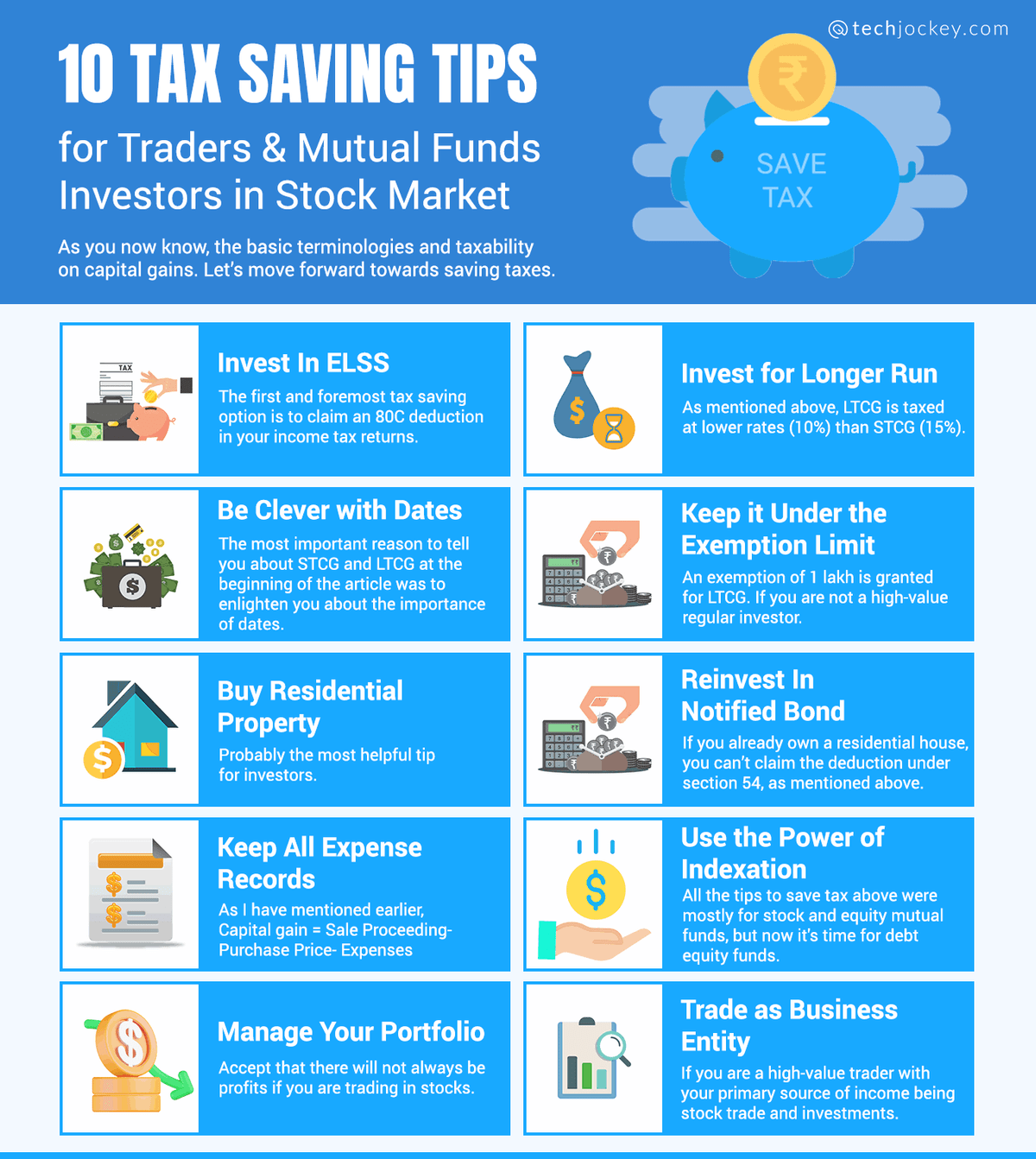Tax Saving Tips for Traders and Investors in Stock & Mutual Funds

Tax saving is the word that everyone loves – Government Excluded! The reason for this is straightforward. Government levies tax on practically anything and everything possible.
In 2018, India became the only country in the world to tax both long-term capital gain and short-term capital gain. If you are confused with the big words, stick to this article for a few more minutes to find out.
A few years earlier, most of the taxes from mutual funds, dividends, and long-term capital gains were exempt, which encouraged most salaried and self-employed people to invest in the stock market. But now, things have changed, and the government has been a bit aggressive towards investors and traders.
However, with some knowledge of taxation and tax planning, you can save more than INR 150,000 in taxes every year. This article will introduce some easy smart tax-saving tips for traders and investors.
First Things First: The Basic Understanding of Tax Terms & Rules
Before I directly explain to you how to save taxes or tax saving ideas, here are a few terms and tax rules that you need to understand related to Trading and Mutual Funds taxation.
Note: All the rules and terminologies are related explicitly to Stock Trading and Mutual Funds. It may not apply to selling other capital assets like house property or land.
Capital Gain: Any profit derived from selling a stock, debt, equity, mutual fund, bond, capital assets, etc. is Capital Gain.
- Capital Gain = Sale Proceeding – Purchase Price – Expenses
- Taxability: A flat rate of 10.4% (including Cess) or 15.6% (including Cess) is charged on capital gain depending on the holding time.
Long Term Capital Gain (LTCG): Whenever you sell stocks/ equity/ shares or equity mutual fund after holding it for more than 12 months, the profit/loss derived from it is called long-term capital gain/loss.
- Taxability: Profits up to 1 lakh is exempt. The rest of the amount is taxable at 10.4% (including Cess)
Short Term Capital Gain: Whenever you sell stocks/ equity/shares or mutual funds after holding them for less than 12 months, the profit/loss derived from them is called short-term capital gain/loss.
- Taxability: Straight 15.6% (including Cess)
Equity Mutual Fund: Mutual funds with more than 65% allocation in equity.
- Taxability:
- LTCG: If you hold mutual funds for more than one year, the profits will be exempt up to 1 lakh, and the rest will be taxed at 10%.
- STCG: If you hold mutual funds for less than one year, the profits will be taxed at 15%.
Debt Mutual Fund: Mutual fund with less than 65% equity allocation.
- Taxability:
- LTCG: If you hold debt mutual funds for more than three years, the profits will be exempt from tax up to 1 lakh, and the rest will be taxed at 20.8% with indexation.
Note: Profits from Debt Mutual funds are considered LTCG only when the holding period is at least 36 months. (While for all other transactions, long term is considered when holding for at least 12 months for Debt Mutual Fund its 36 Months. Therefore, you must wait longer to pay taxes at lower rates.)
- STCG: If you hold debt mutual funds for less than three years, the profits will be taxable at standard slab rates.
Suggested Read: Most Accurate Intraday Trading Indicators for Option Trading
10 Tax Saving Tips for Traders & Mutual Funds Investors in Stock Market
- Invest In ELSS
- Invest for Longer Run
- Be Clever with Dates
- Keep it Under the Exemption Limit
- Buy Residential Property
- Reinvest In Notified Bond
- Keep All Expense Record
- Use the Power of Indexation
- Manage Your Portfolio
- Trade as Business Entity
As you now know, the basic terminologies and taxability on capital gains. Let’s move forward towards saving taxes.
As an investor, your returns could be cut from 20% to 16% if you don’t plan your taxes correctly. The tax saving tips for traders given below are not based on loopholes or exploitation of relaxations.
These traders tips for tax saving are 100 percent legal and genuine methods of saving tax. Indian government provides a few options for tax saving to boost investment and encourage savings.

Invest In ELSS
The first and foremost traders tips for tax saving option is to claim an 80C deduction in your income tax returns. ELSS is an equity mutual fund that is eligible for deductions. If you invest 1,50,000 every year in an ELSS, you can save 46, 800 (assuming your annual income is more than 10 lakhs).
The best part about ELSS savings is you can save tax with this investment whether you are salaried, self-employed, or professional.
Invest for Longer Run
As mentioned above, LTCG is taxed at lower rates (10%) than STCG (15%). So, whenever you make investments, try to hold the investment for more than one year to save the excess 5% on the gain. Besides, an exemption limit of 1 lakh is also applicable for LTCG, which you can’t avail of for STCG.
Be Clever with Dates
The most important reason to tell you about STCG and LTCG at the beginning of the article was to enlighten you about the importance of dates.
Always record your purchase dates and plan before you want to sell stock. You can sell stocks or mutual fund holding for a few days more to fall in the lower tax rates of LTCG.
Example
Suppose you have invested in an IPO on 31st December 2021, and you want to sell the stock after one year, try to sell it after 1st January 2023. If you sell the stocks on or before completion of one year (which most people do if they see a spike in price), you will be deprived of a 1 lakh exemption limit, and you would be taxed at a high rate under STCG, i.e., 15.6%.
Suggested Read: Best Professional Options Trading Software in India
Keep it Under the Exemption Limit
An exemption of 1 lakh is granted for LTCG. If you are not a high-value regular investor, you can plan your stocks or mutual funds so that capital gains do not exceed the exemption limit.
To do this correctly, you need to understand a financial year. The financial year starts on 1st April of the year and ends on 31st March of the subsequent year. Any profits made during this period are referred to as Capital Gain for the year.
If you have already made a profit of 1 lakh in a financial year, keep hold of sales of your other investments for the next financial year.
Buy Residential Property*
Probably one of the most helpful tax saving tips for traders and investors. If Even after all the deductions, exemptions, and planning, you have a significant amount of LTCG, buy a residential house, and the LTCG will be exempt from taxes. (Section 54, Finance Act).
Example
You have bought stocks at 20 lakhs and sold them at 51 lakhs after holding them for more than 1 Year (Equity) or 3 years (Debt Mutual Fund). Here is how much you will be taxed if you don’t buy a residential house.
Capital Gain = 51 lakh-20 lakh = 31 lakh
Taxable Capital Gain after Exemption: 31 lakh – 1Lakh (exemption) = 30 Lakh
Tax Liability = 30 lakh * 10.4 % (Tax + Cess on LTCG) = 3 lakh 12 thousand.
Invest the entire sale proceedings (51 lakh) in buying a new residential house within one year from the date of the sale and save the entire tax of 3 lakh 12 thousand.
Reinvest In Notified Bond*
If you already own a residential house, you can’t claim the deduction under section 54, as mentioned above. Although, you can reinvest the sale proceedings of long-term capital holdings in notified Government bonds or securities.
You must buy the bond or security within months 6 Months from the date of sale of capital asset to claim the exemption. The maximum allowed investment is 50 lakhs (twice a year).
Keep All Expense Record
As I have mentioned earlier,
Capital Gain = Sale Proceeding – Purchase Price – Expenses
Most rookie investors make the same mistake of not recording the brokerage, commission, and other charges incurred while buying and selling stocks.
Claiming incurred expenses lowers Capital gain, which in turn reduces taxes. Keeping all the correct data through an excel sheet or portfolio management app would help you to save on taxes.
Use the Power of Indexation
All the tips to save tax above were mostly for stock and equity mutual funds, but now it’s time for debt equity funds. Debt funds are generally charged at higher rates than Equity mutual funds, but LTCG on Debt equity is calculated after indexation.
Example
If you buy a debt-mutual fund of NRV 1000 and sell it at 1500 after 5 years.
In Normal Cases (Stocks and Equity Mutual Funds):
Profit = 1500 – 1000 = 500
This is not the case with the LTCG of debt fund. You can adjust cost inflation from a specified chart. For example, if the corresponding index rate is 100 on buying date and 120 on the selling date, the Capital Gain will be calculated as
For Long Term Debt Fund:
Profit =1500- [1000*(120/100)] = 300
Indexations is a complex topic that you should leave to professionals or income tax software like ClearTax. ClearTax automatically calculates Capital gain after indexation and other expenses incurred. It calculates your taxes and helps with savings.
Manage Your Portfolio
Accept that there will not always be profits if you are trading in stocks. Most people think loss is useless, but even a broken clock is right twice a day, and so is the case will losses. You can set off your losses with your profits in the same year or subsequent years.
- Short Term Capital Loss: STCL could be set off against any other STCG or LTCG in the same year for the next eight years.
- Long Term Capital Loss: LTCL could be set off only against LTCG in the same year or could be carried forwarded for the next eight years.
The key points of tips for traders is that you should note are keeping accurate records of the losses and profits you make to set off the loss with gains and reduce Capital gain taxes.
Suggested Read: Best Free Income Tax Software for Tax eFiling, IT and TDS Returns
Trade as Business Entity
If you are a high-value trader with your primary source of income being stock trade and investments, it is advised that you move to a higher level and trade stocks as an entity rather than just as a source of income.
The best benefit of among this tips for traders is the income will be treated as business income rather than capital gain. Capital Gain taxes are calculated directly on all the profits made on sales, while business income is calculated only after deducting all expenses.
You can claim all other expenses that you have incurred to earn this income like rent, depreciation, salary, telephone bills, and internet expenses.
Example
Although there are thousands of rules related to these, here is a simple example for basic understanding.
If you have brought stocks of 10 lakh and sold them at 15 lakhs in six months. Expenses incurred are 20K as brokerage.
Capital Gains as an Income source:
Capital Gain = 10 lakh – 15 lakh – 20 thousand = 4 lakh 80 thousand
Taxes = 15.6% * 4,80,000 = 74,880
As Business Income:
Profit = 4,80,000 – Rent – depreciation (computer, furniture of office, smartphone) – bills (internet, telephone) = Assume 1,50,000
Tax = 31.2% * 1,50,000 = 46,800.
Therefore, trading as a business could save a lot of taxes if you are a high-volume trader. Low-volume traders shouldn’t trade as a business because it’s complicated and requires meeting many government compliances.
How Can You Calculate Your Taxes Accurately with ClearTax?
ClearTax Income Tax Software can help you calculate your tax liabilities and save your taxes correctly. ClearTax is used by thousands of taxpayers and small businesses all over India to manage their income tax and GST. ClearTax can help you to:
- Accurately calculate all the Capital Gains based on the date of acquisition and sales.
- Charge all the expenses while calculating Capital Gains for a particular year.
- Calculate the exact Indexed Cost of Acquisition for your applicable capital gains.
- Set off the losses with profits of subsequent years as per the regulation.
*These exemptions come with multiple clauses and exceptions. Please take professional advice if opting for any of these exemptions.
Related Categories: GST Software | Expense Management Software | Debt Collection Software | Accounting Software | Stock Market Software | CryptoCurrency Software
Rajan is pursuing CA with a keen interest in trends and technologies for taxation, payroll compliances, Tally Accounting, and financial nuances. He is an expert in FinTech solutions and loves writing about the vast scope of this field and how it can transform the way individuals and businesses... Read more




























